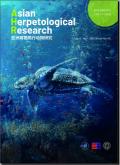Effects of Different Rearing Strategies and Ages on Levels of Natural Antibodies in Saliva of the Philippine Crocodile
IF 1.2
3区 生物学
Q2 ZOOLOGY
引用次数: 5
Abstract
The endemic Philippine crocodile (Crocodylus mindorensis) is a relatively small, critically endangered freshwater crocodile. In a head start program, crocodile hatchlings are caught in the wild, reared in captivity, and released back into the wild after two years. The current study aimed to determine optimal rearing strategies of Philippine crocodile hatchlings, including identification of possible diseases during rearing, and studying the effect of ages on natural antibody (NAb) levels. Thirty Philippine crocodiles were divided into two groups, half were reared with a hiding board, and half without the hiding board. Both groups received three different kinds of diets: meat, shrimp, or a combination of both. Saliva samples of the crocodiles were taken three times over a period of three months to test for NAb levels. Saliva samples were also taken from older crocodiles and crocodiles from different locations. NAb titres were compared to sheep red blood cells. Each time saliva samples were taken, a health check was done. The results showed that crocodiles would prefer the hiding board, and neither housing nor diet could affect the level of NAb titres in saliva. A positive correlation was found between NAb titres and body size, weight and age. Wild hatchlings had higher NAb titres than the hatchlings born in captivity, but the difference diminished with ageing. Five different diseases were found不同饲养策略和年龄对菲律宾鳄唾液天然抗体水平的影响
特有的菲律宾鳄鱼(Crocodylus mindorensis)是一种相对较小的,极度濒危的淡水鳄鱼。在一项先行计划中,鳄鱼幼崽在野外被捕获,圈养,两年后放回野外。本研究旨在确定菲律宾鳄鱼幼崽的最佳饲养策略,包括鉴定饲养过程中可能出现的疾病,以及研究年龄对天然抗体(NAb)水平的影响。30条菲律宾鳄鱼被分成两组,一半用隐藏板饲养,一半没有隐藏板饲养。两组都接受了三种不同的饮食:肉、虾或两者的组合。在三个月的时间里,研究人员采集了三次鳄鱼的唾液样本,以检测NAb的水平。研究人员还从年龄较大的鳄鱼和来自不同地点的鳄鱼身上采集了唾液样本。NAb滴度与绵羊红细胞进行比较。每次采集唾液样本时,都会进行健康检查。结果表明,鳄鱼更喜欢隐藏板,住房和饮食都不会影响唾液中NAb的滴度。NAb滴度与体型、体重和年龄呈正相关。野生幼崽的NAb浓度高于圈养幼崽,但随着年龄的增长,这种差异逐渐减弱。他们发现了五种不同的疾病
本文章由计算机程序翻译,如有差异,请以英文原文为准。
求助全文
约1分钟内获得全文
求助全文
来源期刊

Asian Herpetological Research
ZOOLOGY-
CiteScore
2.80
自引率
7.10%
发文量
441
审稿时长
>12 weeks
期刊介绍:
AHR aims to provide a forum for herpetologists and related scientists interested in conducting international academic exchanges and joint studies, and a platform for introducing their newly made scientific and technological data, and publishing their research results and achievements in the world, but focusing on the Asian-Pacific Region.
The principal criteria of AHR for acceptance of articles for publication are the quality and significance of the research, breadth of interest of the work to the readership, and the clarity and effectiveness of communication. AHR welcomes submission of manuscripts from authors in all countries of the world, though with a focus on the herpetological studies in the Asian and Pacific Region, including major articles, shorter communications and review articles.
 求助内容:
求助内容: 应助结果提醒方式:
应助结果提醒方式:


